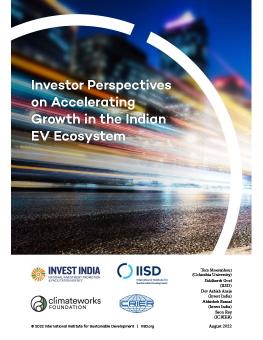
Investor Perspectives on Accelerating Growth in the Indian EV Ecosystem
The report takes stock of India’s current EVs ecosystem and where the sector may be heading in the future, with a focus on drivers of and barriers to investment. The research for this study involved in-depth consultations with experts, policymakers, investors, and companies, as well as results from an online survey with EV experts and companies. The report presents the main takeaways of this research.
-
India is successfully incentivizing consumer demand for electrified two-wheel and three-wheel vehicles.
-
India has major potential for battery manufacturing and has initiated policy schemes to incentivize battery manufacturing in the country.
-
India will need to meet challenges other countries have to deal with as well, including supply chain vulnerabilities and guaranteeing enough recharging infrastructure.
The main takeaways from this report can be summarized as follows:
- India is successfully incentivizing consumer demand for electrified two-wheel and three-wheel vehicles and is beginning to scale up demand for electrified four-wheel vehicles and buses, too.
- India remains a minor player in battery manufacturing, which is still dominated by China, but it has initiated policy schemes to incentivize battery manufacturing in the country. Consulted investors and companies see major growth potential for India in this realm, which they believe will help it to expand domestic battery production and EV adoption dramatically.
- For India to achieve the scale of EV growth it desires, however, it will need to address financing challenges for consumers and the country’s insufficient charging infrastructure. Although the government has formulated policy solutions on both fronts, investors and companies consulted for this report identified space for improvement and expansion. Other potential obstacles to this growth include supply chain shortages, lack of complementarity between state and federal policies, and skill gaps in the labor force.
- The country could also embrace battery swapping, which experts believe can help to expand EV demand and adoption and which the Indian government has already begun to support through policy initiatives.
Participating experts
You might also be interested in
State of the Sector: Critical energy transition minerals for India
This report presents a comprehensive strategy for securing a reliable supply of critical energy transition materials (CETMs) essential to India's clean energy and low-carbon technology initiatives.
Implementing Solar Irrigation Sustainably
This guidebook provides recommendations to state policy-makers on how they can implement solar irrigation models, particularly decentralized solar plants for irrigation under the PM-KUSUM scheme, effectively and sustainably.
Increased Support Needed to Achieve India's Clean Energy Goals
India is on track to achieve many of its 2030 clean energy goals but needs to step up government support measures to accelerate the deployment of offshore wind, electric vehicles, and green hydrogen, according to a new report.
India Faces Clean Energy Challenges as Energy Demand Soars and Global Fossil Fuel Subsidies Rise
New research finds the global energy crisis and increasing energy demand have pushed India's energy subsidies to a 9-year high.